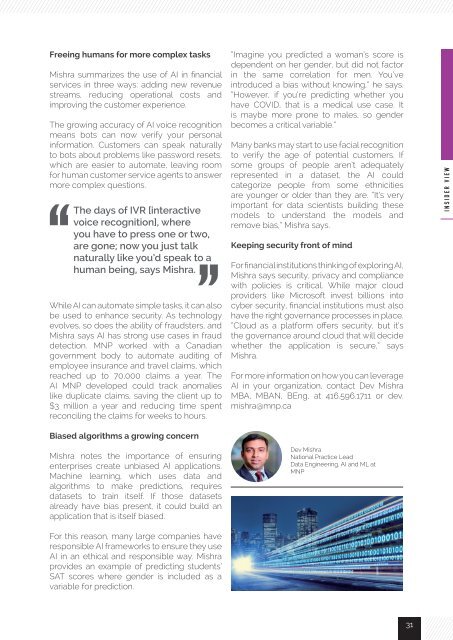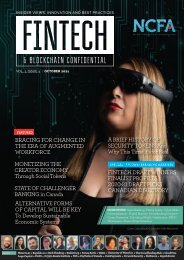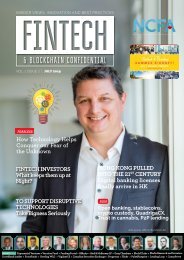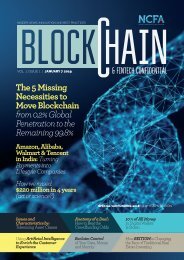NCFA Fintech Confidential December 2020 (Issue 3)
The National Crowdfunding & Fintech Association of Canada (NCFA) and partners are excited to present Vol. 1 Issue 3, FINTECH CONFIDENTIAL, a digital pop-up of the 6th annual 2020 Fintech & Financing Conference and Expo (FFCON20) held virtually across themed 8 weeks from July 9 to August 27 and co-hosted by NCFA and Toronto Finance International. The main theme of FFCON20 was “RISE”, reflecting the joint efforts of the two associations, NCFA and TFI, to build and increase the success and sustainability of Canada’s fintech and financial sector. There were many moving parts this year and a brand-new digital format with the event bringing together 100+ thought leaders, 50+ partners, and more than 500 attendees, 2 challenges and the inaugural Fintech Draft pitching and demo competitions. Congratulations to the winners: SolidBlock and MazumaGo (formerly DivDot)! Thanks to all the partners, speakers, attendees, volunteers and the entire organizing team for making FFCON20 an impactful and amazing online experience for Canada’s fintech and funding community. We hope you enjoy this issue of Fintech Confidential magazine – it certainly makes for great holiday reading! While everyone relentlessly strives to achieve success in 2021, we encourage you to bring in the new year with good health and to be mindful that we are all in this together, and to help others in your community more than ever before. Peace, happiness, and best wishes for an incredible year and journey ahead.
The National Crowdfunding & Fintech Association of Canada (NCFA) and partners are excited
to present Vol. 1 Issue 3, FINTECH CONFIDENTIAL, a digital pop-up of the 6th annual 2020 Fintech & Financing Conference and Expo (FFCON20) held virtually across themed 8 weeks from July 9 to August 27 and co-hosted by NCFA and Toronto Finance International.
The main theme of FFCON20 was “RISE”, reflecting the joint efforts of the two associations, NCFA and TFI, to build and increase the success and sustainability of Canada’s fintech and financial sector. There were many moving parts this year and a brand-new digital format with the event bringing together 100+ thought leaders, 50+ partners, and more than 500 attendees, 2 challenges and the inaugural Fintech Draft pitching and demo competitions. Congratulations to the winners: SolidBlock and MazumaGo (formerly DivDot)! Thanks to all the partners, speakers, attendees, volunteers and the entire organizing team for making FFCON20 an impactful and amazing online experience for Canada’s fintech and funding community.
We hope you enjoy this issue of Fintech Confidential magazine – it certainly makes for great holiday reading! While everyone relentlessly strives to achieve success in 2021, we encourage you to bring in the new year with good health and to be mindful that we are all in this together, and to help others in your community more than ever before. Peace, happiness, and best wishes for an incredible year and journey ahead.
Create successful ePaper yourself
Turn your PDF publications into a flip-book with our unique Google optimized e-Paper software.
Freeing humans for more complex tasks<br />
Mishra summarizes the use of AI in financial<br />
services in three ways: adding new revenue<br />
streams, reducing operational costs and<br />
improving the customer experience.<br />
The growing accuracy of AI voice recognition<br />
means bots can now verify your personal<br />
information. Customers can speak naturally<br />
to bots about problems like password resets,<br />
which are easier to automate, leaving room<br />
for human customer service agents to answer<br />
more complex questions.<br />
The days of IVR [interactive<br />
voice recognition], where<br />
you have to press one or two,<br />
are gone; now you just talk<br />
naturally like you’d speak to a<br />
human being, says Mishra.<br />
While AI can automate simple tasks, it can also<br />
be used to enhance security. As technology<br />
evolves, so does the ability of fraudsters, and<br />
Mishra says AI has strong use cases in fraud<br />
detection. MNP worked with a Canadian<br />
government body to automate auditing of<br />
employee insurance and travel claims, which<br />
reached up to 70,000 claims a year. The<br />
AI MNP developed could track anomalies<br />
like duplicate claims, saving the client up to<br />
$3 million a year and reducing time spent<br />
reconciling the claims for weeks to hours.<br />
“Imagine you predicted a woman’s score is<br />
dependent on her gender, but did not factor<br />
in the same correlation for men. You’ve<br />
introduced a bias without knowing,” he says.<br />
“However, if you’re predicting whether you<br />
have COVID, that is a medical use case. It<br />
is maybe more prone to males, so gender<br />
becomes a critical variable.”<br />
Many banks may start to use facial recognition<br />
to verify the age of potential customers. If<br />
some groups of people aren’t adequately<br />
represented in a dataset, the AI could<br />
categorize people from some ethnicities<br />
are younger or older than they are. “It’s very<br />
important for data scientists building these<br />
models to understand the models and<br />
remove bias,” Mishra says.<br />
Keeping security front of mind<br />
For financial institutions thinking of exploring AI,<br />
Mishra says security, privacy and compliance<br />
with policies is critical. While major cloud<br />
providers like Microsoft invest billions into<br />
cyber security, financial institutions must also<br />
have the right governance processes in place.<br />
“Cloud as a platform offers security, but it’s<br />
the governance around cloud that will decide<br />
whether the application is secure,” says<br />
Mishra.<br />
For more information on how you can leverage<br />
AI in your organization, contact Dev Mishra<br />
MBA, MBAN, BEng, at 416.596.1711 or dev.<br />
mishra@mnp.ca<br />
INSIDER VIEW<br />
Biased algorithms a growing concern<br />
Mishra notes the importance of ensuring<br />
enterprises create unbiased AI applications.<br />
Machine learning, which uses data and<br />
algorithms to make predictions, requires<br />
datasets to train itself. If those datasets<br />
already have bias present, it could build an<br />
application that is itself biased.<br />
For this reason, many large companies have<br />
responsible AI frameworks to ensure they use<br />
AI in an ethical and responsible way. Mishra<br />
provides an example of predicting students’<br />
SAT scores where gender is included as a<br />
variable for prediction.<br />
Dev Mishra<br />
National Practice Lead<br />
Data Engineering, AI and ML at<br />
MNP<br />
31






